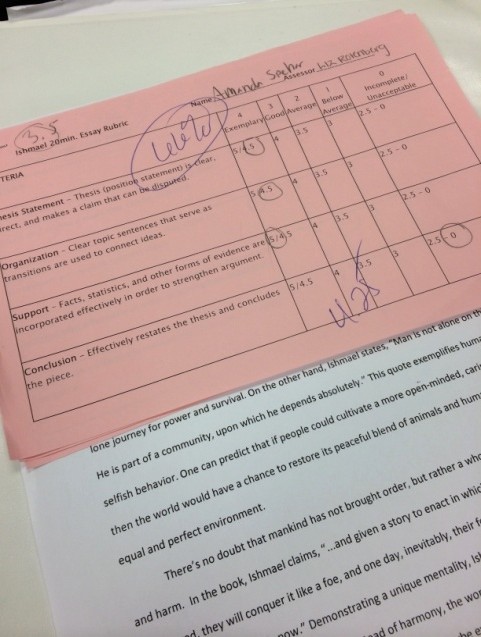Students give insight to 4 point grades in English class
November 16, 2014
For the longest time, teachers would assign students with their earned percentage; however, over the past few years, Mayfield High School has tried something a little different in English class.
The 4 point grading scale is a system that starts at 1 and goes up to four. According to Laila Discenza, Assistant Principal for Student Affairs Grades 11-12, the 4 point system was implemented in English class, and English class only, as a way for students to really be aware of the improvement in their writing and to help express the concept of mastery learning.
Mastery learning, put simply in Discenza’s terms, is “what you know and how you keep working at it until you’ve mastered it.”
Discenza said, in regard to if those expectations of the system were met in English class, “I think so, for communications sake. It helps with peer reviewing in class and helps to take an outside look when you and others are editing work.”
So in a sense, she believes the 4 point system is about “collaboration”.
In the same light, junior Nachshon Yisrael thinks the 4 point grading scale is “helpful when you have to edit someone else’s paper.” He said, “It’s easy to look off of a rubric and give whatever that the person deserves.”
With the grading scale, students are able to understand what a ‘2’ looks like and what a ‘4’ looks like. That way, Discenza said, “You know what number you should attach to the grade; it’s an easy way to check how you’re proceeding.”
However, sophomore Olivia Novario disagrees. She said, “It’s hard to understand what to do with the numbers and earn a good grade.”
From there, with the 4 point grading system, Jeffrey Legan, Principal of Mayfield High School, concurs in regard to the difficulty of the grading scale. Realistically, he believes it is harder for a student to earn an A “because not all students are A students.”
He said, “In the end, [the 4 point grading system] challenges the students more and it’s more transparent; the student will know exactly what they need to earn a certain grade.”
Yisrael explains how the 4 point scale challenges him to do his best. He said, “[The 4 point grading scale] makes me think about what I have to do and what I have to commit to to get the highest grade possible.”
However, if given the chance to be graded with the points or percentages, he would still wish to be graded with regular percentages because “with the scale it makes everything harder.”
But even with all the emphasis for students to use their best and utmost potential, Legan still believes that the 4 point scale isn’t all about grades. “It’s about how much you learn and how much you grow,” he said.
With that in mind, Novario again has a different opinion. She thinks that grades are what matters because “teachers always stress how important it is to get a 4 and that makes it seem like our final grade is more important than the process of writing whatever we’re writing.”
Mayfield’s students deem the grading scale as something pertaining more to the outcome, where as the staff still advocates the grading scale for its values and more sentimental ideas. It is shown when Discenza said, “I think it’s the philosophy behind [the 4 point grading scale] is what’s important.”






















































